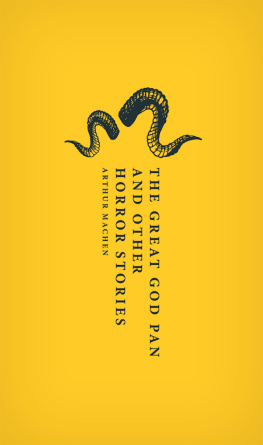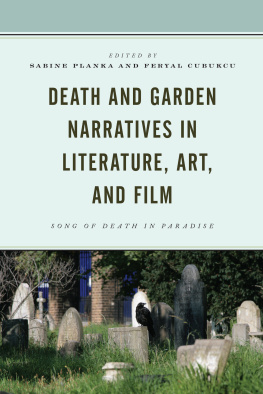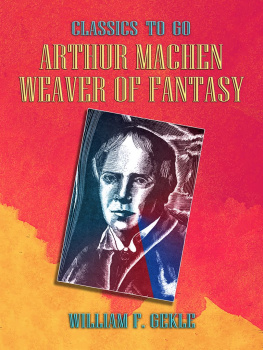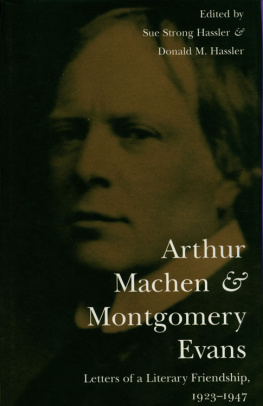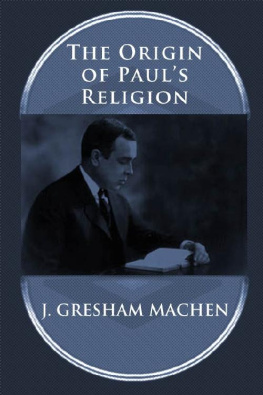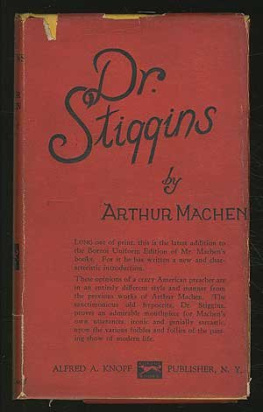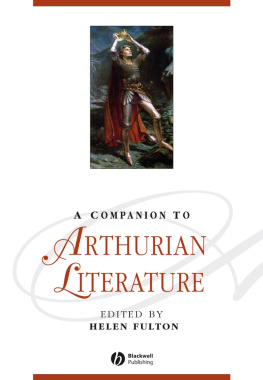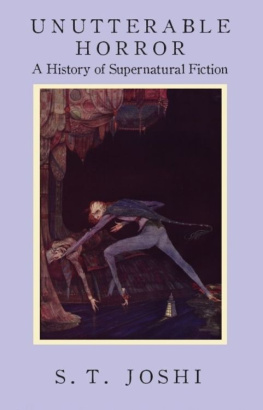Arthur Machen - Hieroglyphics
Here you can read online Arthur Machen - Hieroglyphics full text of the book (entire story) in english for free. Download pdf and epub, get meaning, cover and reviews about this ebook. year: 2014, publisher: Duke Classics, genre: Art. Description of the work, (preface) as well as reviews are available. Best literature library LitArk.com created for fans of good reading and offers a wide selection of genres:
Romance novel
Science fiction
Adventure
Detective
Science
History
Home and family
Prose
Art
Politics
Computer
Non-fiction
Religion
Business
Children
Humor
Choose a favorite category and find really read worthwhile books. Enjoy immersion in the world of imagination, feel the emotions of the characters or learn something new for yourself, make an fascinating discovery.
- Book:Hieroglyphics
- Author:
- Publisher:Duke Classics
- Genre:
- Year:2014
- Rating:3 / 5
- Favourites:Add to favourites
- Your mark:
- 60
- 1
- 2
- 3
- 4
- 5
Hieroglyphics: summary, description and annotation
We offer to read an annotation, description, summary or preface (depends on what the author of the book "Hieroglyphics" wrote himself). If you haven't found the necessary information about the book — write in the comments, we will try to find it.
Welsh writer Arthur Machen achieved literary acclaim with his groundbreaking tales of the supernatural, some of which modern-day horror luminary Stephen King ranks among the best in the English language. In the engaging nonfiction volume Hieroglyphics, Machen turns his focus to literary criticism, opining on the role of the ecstatic in literature.
Hieroglyphics — read online for free the complete book (whole text) full work
Below is the text of the book, divided by pages. System saving the place of the last page read, allows you to conveniently read the book "Hieroglyphics" online for free, without having to search again every time where you left off. Put a bookmark, and you can go to the page where you finished reading at any time.
Font size:
Interval:
Bookmark:

First published in 1902
ISBN 978-1-63421-100-0
Duke Classics
2014 Duke Classics and its licensors. All rights reserved.
While every effort has been used to ensure the accuracy and reliability of the information contained in this edition, Duke Classics does not assume liability or responsibility for any errors or omissions in this book. Duke Classics does not accept responsibility for loss suffered as a result of reliance upon the accuracy or currency of information contained in this book.
It was my privilege, many years ago, to make the acquaintance of theobscure literary hermit, whose talk I have tried to reproduce in thepages that follow. Our first meeting was one of those chance affairsthat now and then mitigate the loneliness of the London streets, and asecond hazard led to the discovery that we had many interests in common.I think that the Hermit (as I shall call him) had begun to find theperpetual solitude of his years a growing terror, and he was not sorryto have a listener; at first, indeed, he talked almost with the joy of achild, or rather of a prisoner who has escaped from the house ofsilence, but as he chose subjects which have always interested meintensely, he gave as much pleasure as he received, and I became anassiduous visitor of his cell.
He had found an odd retreat. He avoided personalities, and had a happyknack of forgetting any that I vouchsafed on my side, (he forgot my namethree times on the first evening that we spent together, and succeededin repeating this feat over and over again since then), and I nevergathered much of his past history. But I believe that "something hadhappened" many years before, in the prehistoric age of the 'seventies.There had been a break of some sort in the man's life when he was quiteyoung; and so he had left the world and gone to Barnsbury, an almostmythical region lying between Pentonville and the Caledonian Road. Here,in the most retired street of that retired quarter, he occupied tworooms on the ground floor of a big, mouldy house, standing apart fromthe street and sheltered by gaunt grown trees and ancient shrubs; andjust beside the dim and dusty window of the sitting-room a laburnum hadcast a green stain on the decaying wall. The laburnum had grown wild,like all the trees and shrubs, and some of its black, straggling boughsbrushed the pane, and of dark, windy nights while we sat together andtalked of art and life we would be startled by the sudden violence withwhich those branches beat angrily upon the glass.
The room seemed always dark. I suppose that the house had been built inthe early eighteenth century, and had been altered and added to atvarious periods, with a final "doing up" for the comparative luxury ofsomeone in the 'tens or 'twenties; there were, I think, twenty rooms init, and my friend used to declare that when a new servant came she spentmany months in finding her way in the complicated maze of stairs andpassages, and that the landlady even was now and then at fault. But theroom in which we sat was hung with flock paper, of a deep and heavycrimson colour, and even on bright summer evenings the crimson lookedalmost black, and seemed to cast a shadow into the room. Often we satthere till the veritable darkness came, and each could scarcely see thewhite of the other's face, and then my friend would light two lonelycandles on the mantelpiece, or if he wished to read he set one on atable beside him; and when the candles were lighted I thought that thegloom grew more intense, and looking through the uncurtained window onecould not see even the friendly twinkle of the gas-lamp in the street,but only the vague growth of the laburnum, and the tangle of boughsbeyond.
It was a large room and gave me always a sense of empty space. Againstone wall stood a heavy bookcase, with glass doors, solid and of darkmahogany, but made in the intermediate period that came betweenChippendale and the modern school of machine-turned rubbish. In theduskiest corner of the room there was a secretaire of betterworkmanship, and two small tables and three gaunt chairs made up thefurnishing. The Hermit would sometimes pace up and down in the voidcentre of the room as he talked, and if I chanced to be sitting by thewindow, his shape would almost disappear as he neared the secretaire onhis march, and I heard the voice, and used to wonder for a momentwhether the man had not vanished for ever, having been resolved into theshadows about him.
I have spent many evenings in that old mouldering room, where, when wewere silent for an instant, the inanimate matter about us found a voice,and the decaying beams murmured together, and a vague sound might comefrom the cellars underneath. And it always seemed to me as if thecrypt-like odour of the cellar rose also into the room, mingling with afaint suggestion of incense, though I am sure that my friend neverburned it. Here then, with such surroundings as I have indicated, weheld our sessions and talked freely and with enjoyment of many curiousthings, which, as the Hermit would say, had the huge merit ofinteresting no one but ourselves.
He would sometimes, whimsically, compare himself to Coleridge, and Ithink that he often deliberately talked in S. T. C.'s manner withdelight in the joke. For, I need hardly say that the comparison was notin any way a serious one; he had a veneration for Coleridge'sachievement, with a still greater veneration for that which Coleridgemight have achieved, which would have caused him to regard any suchcomparison, seriously entertained, as unspeakably ludicrous. Still, heliked to regard himself as a very humble disciple in Coleridge's school,he was fond, as I have said, of imitating his master's manner as well ashe could, and I think that he cherished, in the fashion of S. T. C., thenotion that he had a "system," an esoteric philosophy of things; hesought for a key that would open, and a lamp that would enlighten allthe dark treasure-houses of the Universe, and sometimes he believed thathe held both the Key and the Lamp in his hands.
It is a confession of mysticism, but I incline to think that he wasright in this belief. I recall the presence of that hollow, echoingroom, the atmosphere with its subtle suggestion of incense sweeteningthe dank odours of the cellar, and the tone of the voice speaking to me,and I believe that once or twice we both saw visions, and some glimpseat least of certain eternal, ineffable Shapes. But these matters, themore esoteric doctrines of "the system" have entered hardly or not atall into the very imperfect and fragmentary notes that I have made ofhis conversations on literature.
I should scarcely be justified in calling him a literary monomaniac. Butit is true that Art in general, and the art of literature in particularhad for him a very high significance and interest; and he was alwaysready to defend the thesis that, all the arts being glorious, theliterary art was the most glorious and wonderful of all. He reverencedmusic, but he was firm in maintaining that in perfect lyrical poetrythere is the subtlest and most beautiful melody in the world.
I can scarcely say whether he wrote much himself. He would speak ofstories on which he was engaged, but I have never seen his name onpublishers' lists, and I do not think that he had adopted a pseudonym.One evening, I remember, I came in a little before my accustomed time,and in the shadowy corner of the room, a drawer in the secretaire wasopen, and I thought that it looked full of neat manuscripts. But I neverspoke to him about his literary work; and I noticed that he did not muchcare to talk of literature from the commercial standpoint.
Font size:
Interval:
Bookmark:
Similar books «Hieroglyphics»
Look at similar books to Hieroglyphics. We have selected literature similar in name and meaning in the hope of providing readers with more options to find new, interesting, not yet read works.
Discussion, reviews of the book Hieroglyphics and just readers' own opinions. Leave your comments, write what you think about the work, its meaning or the main characters. Specify what exactly you liked and what you didn't like, and why you think so.


